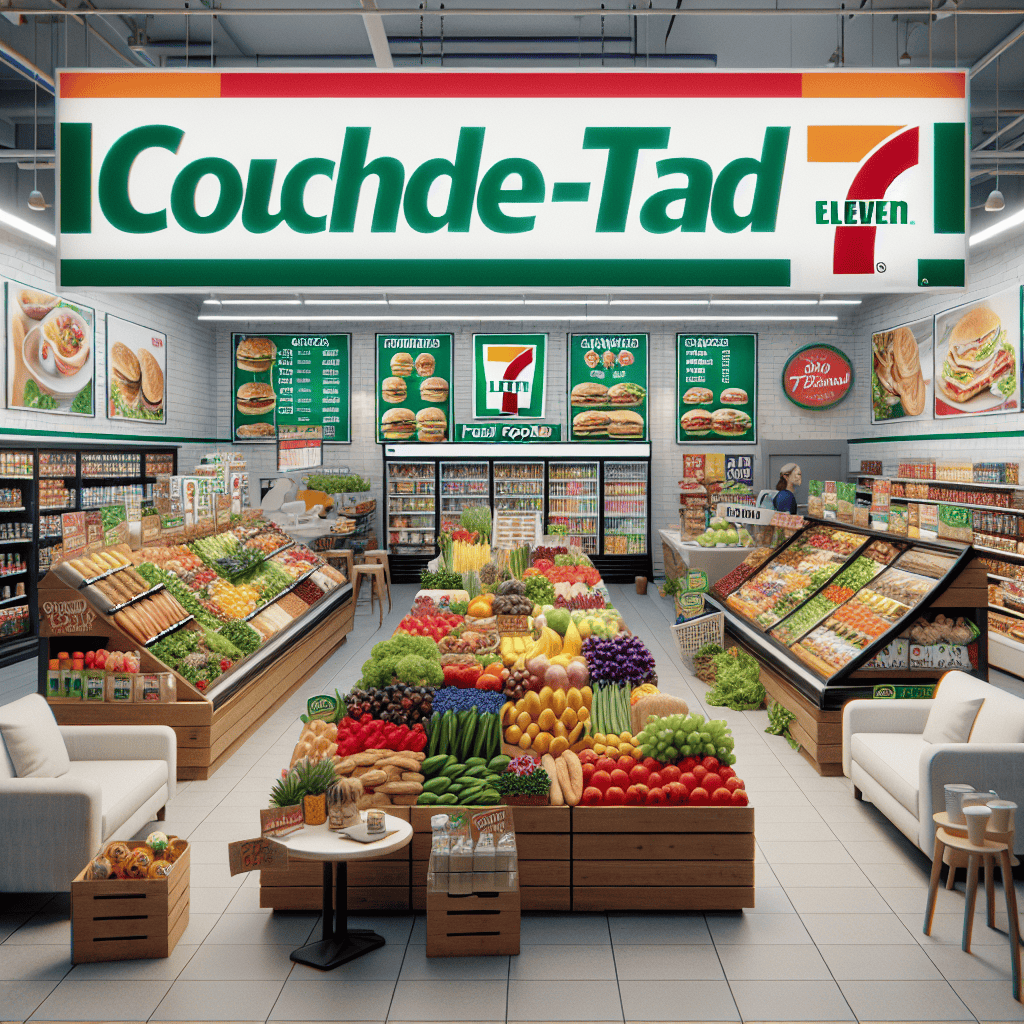“Fueling Convenience with Freshness: Couche-Tard’s Vision for 7-Eleven”
Introduction
Alimentation Couche-Tard, a leading global convenience store operator, is strategically focusing on expanding its fresh food offerings as part of its ambitious acquisition effort of 7-Eleven. This move underscores Couche-Tard’s commitment to diversifying its product range and enhancing customer experience by integrating healthier and more convenient food options into its stores. By targeting 7-Eleven, a well-established brand with a significant market presence, Couche-Tard aims to leverage synergies and capitalize on the growing consumer demand for fresh and ready-to-eat meals. This initiative not only aligns with current industry trends but also positions Couche-Tard to strengthen its competitive edge in the convenience retail sector.
Strategic Implications of Couche-Tard’s Fresh Food Expansion in 7-Eleven Acquisition
Alimentation Couche-Tard, a prominent player in the global convenience store industry, has set its sights on expanding its fresh food offerings as part of its strategic efforts to acquire 7-Eleven. This move is not merely a tactical maneuver to enhance its product portfolio but also a calculated step to align with evolving consumer preferences and market trends. As the demand for healthier and more convenient food options continues to rise, Couche-Tard’s focus on fresh food could serve as a significant differentiator in the competitive landscape of convenience retail.
The acquisition of 7-Eleven, a well-established brand with a vast network of stores, presents Couche-Tard with a unique opportunity to leverage its existing infrastructure to introduce and expand fresh food offerings. By integrating fresh food into 7-Eleven’s product mix, Couche-Tard aims to attract a broader customer base, including health-conscious consumers who are increasingly seeking nutritious alternatives to traditional convenience store fare. This strategic shift not only enhances the value proposition for customers but also positions Couche-Tard as a forward-thinking leader in the industry.
Moreover, the expansion into fresh food aligns with Couche-Tard’s long-term growth strategy, which emphasizes diversification and innovation. By investing in fresh food, the company can tap into new revenue streams and mitigate risks associated with fluctuating demand for traditional convenience store products. This approach also allows Couche-Tard to capitalize on the growing trend of consumers opting for quick, healthy meals and snacks, thereby increasing foot traffic and boosting sales across its store network.
In addition to meeting consumer demand, the focus on fresh food offerings can also enhance Couche-Tard’s brand image and reputation. As sustainability and health become increasingly important to consumers, companies that prioritize these values are likely to gain a competitive edge. By offering fresh, locally sourced, and environmentally friendly food options, Couche-Tard can strengthen its brand identity and foster customer loyalty. This, in turn, can lead to increased market share and profitability in the long run.
Furthermore, the integration of fresh food into 7-Eleven’s operations could lead to operational efficiencies and cost savings. By streamlining supply chains and optimizing inventory management, Couche-Tard can reduce waste and improve margins. Additionally, the introduction of fresh food may encourage partnerships with local suppliers and farmers, fostering community engagement and supporting local economies. This collaborative approach not only benefits Couche-Tard but also contributes to the broader goal of sustainable business practices.
However, the expansion into fresh food is not without its challenges. Couche-Tard must navigate logistical complexities, such as maintaining product quality and freshness across a vast network of stores. Additionally, the company must invest in employee training and infrastructure upgrades to ensure the successful implementation of fresh food offerings. Despite these hurdles, the potential rewards of this strategic initiative are significant, making it a worthwhile endeavor for Couche-Tard.
In conclusion, Couche-Tard’s focus on expanding fresh food offerings as part of its 7-Eleven acquisition effort represents a strategic move to align with consumer preferences, enhance brand reputation, and drive long-term growth. By capitalizing on the demand for healthier and more convenient food options, Couche-Tard can differentiate itself in the competitive convenience store market and position itself as a leader in innovation and sustainability. As the company navigates the challenges and opportunities of this expansion, its commitment to fresh food could prove to be a pivotal factor in its continued success.
Analyzing the Market Impact of Couche-Tard’s Focus on Fresh Food Offerings
In recent years, the convenience store industry has witnessed a significant shift in consumer preferences, with an increasing demand for fresh and healthy food options. Alimentation Couche-Tard, a leading player in the global convenience store market, has recognized this trend and is strategically positioning itself to capitalize on it. The company’s recent efforts to acquire 7-Eleven, a well-established brand with a vast network of stores, underscore its commitment to expanding its fresh food offerings. This move is not only a response to changing consumer tastes but also a strategic maneuver to enhance its competitive edge in the market.
The acquisition of 7-Eleven presents Couche-Tard with a unique opportunity to leverage the brand’s extensive reach and customer base. By integrating fresh food options into 7-Eleven’s existing product lineup, Couche-Tard aims to attract a broader demographic, including health-conscious consumers who are increasingly seeking convenient yet nutritious meal solutions. This strategic focus on fresh food is expected to differentiate Couche-Tard from its competitors, many of whom are still heavily reliant on traditional convenience store staples such as snacks and beverages.
Moreover, the emphasis on fresh food offerings aligns with broader industry trends, where convenience stores are evolving into destinations for quick, healthy meals. This shift is driven by several factors, including the growing awareness of health and wellness, the rise of urbanization, and the increasing pace of modern life, which leaves consumers with less time to prepare meals at home. By expanding its fresh food offerings, Couche-Tard is not only meeting current consumer demands but also anticipating future trends, positioning itself as a forward-thinking leader in the industry.
In addition to enhancing its product offerings, Couche-Tard’s focus on fresh food is likely to have a positive impact on its financial performance. Fresh food items typically offer higher profit margins compared to traditional convenience store products, which can contribute to improved overall profitability. Furthermore, by attracting a more diverse customer base, Couche-Tard can increase foot traffic in its stores, leading to higher sales volumes and greater brand loyalty.
However, the integration of fresh food offerings into 7-Eleven’s operations is not without challenges. It requires significant investment in supply chain infrastructure, including sourcing, storage, and distribution capabilities, to ensure the freshness and quality of the products. Additionally, staff training and development will be crucial to effectively manage the complexities associated with fresh food handling and customer service. Despite these challenges, Couche-Tard’s strong operational capabilities and experience in the convenience store sector position it well to successfully navigate this transition.
As Couche-Tard moves forward with its acquisition of 7-Eleven and the expansion of its fresh food offerings, the market will be closely watching the impact of this strategic initiative. If successful, it could set a new standard for the convenience store industry, prompting other players to follow suit and further accelerating the shift towards healthier, more diverse product offerings. Ultimately, Couche-Tard’s focus on fresh food not only reflects its commitment to meeting evolving consumer needs but also highlights its ambition to lead the industry in innovation and growth. As the company continues to adapt and evolve, it will be interesting to observe how its strategic initiatives shape the future of convenience retailing.
How Couche-Tard’s Fresh Food Strategy Could Transform Convenience Retail
Alimentation Couche-Tard, a prominent player in the global convenience store industry, has set its sights on expanding its fresh food offerings as part of its strategic efforts to acquire 7-Eleven. This move underscores the company’s commitment to transforming the convenience retail landscape by enhancing the quality and variety of products available to consumers. As the demand for healthier and more diverse food options continues to rise, Couche-Tard’s focus on fresh food could significantly reshape consumer expectations and industry standards.
The convenience store sector has traditionally been associated with quick, on-the-go snacks and beverages, often lacking in nutritional value. However, changing consumer preferences have prompted a shift towards healthier and more sustainable food choices. Recognizing this trend, Couche-Tard aims to capitalize on the opportunity to redefine convenience retail by integrating fresh food options into its offerings. This strategic pivot not only aligns with evolving consumer demands but also positions the company as a forward-thinking leader in the industry.
In its pursuit of acquiring 7-Eleven, Couche-Tard envisions leveraging the extensive network and brand recognition of the latter to accelerate its fresh food strategy. By incorporating fresh produce, ready-to-eat meals, and other nutritious options into 7-Eleven’s product lineup, Couche-Tard seeks to attract a broader customer base and enhance the overall shopping experience. This approach not only caters to health-conscious consumers but also addresses the growing trend of convenience stores serving as alternative dining destinations.
Moreover, Couche-Tard’s emphasis on fresh food is expected to drive operational efficiencies and boost profitability. By sourcing locally and optimizing supply chain processes, the company can reduce costs and minimize waste, ultimately leading to improved margins. Additionally, offering fresh food options can increase foot traffic and encourage repeat visits, as consumers are more likely to frequent stores that provide a diverse range of high-quality products. This, in turn, can lead to increased sales and revenue growth for Couche-Tard.
Furthermore, the integration of fresh food offerings aligns with Couche-Tard’s sustainability goals. By prioritizing locally sourced and environmentally friendly products, the company can reduce its carbon footprint and contribute to a more sustainable future. This commitment to sustainability not only resonates with environmentally conscious consumers but also enhances Couche-Tard’s brand image and reputation.
As Couche-Tard continues to pursue the acquisition of 7-Eleven, the potential synergies between the two companies could further amplify the impact of the fresh food strategy. The combination of Couche-Tard’s innovative approach and 7-Eleven’s established market presence could create a powerful force in the convenience retail sector. This collaboration has the potential to set new benchmarks for the industry, encouraging other players to follow suit and prioritize fresh food offerings.
In conclusion, Couche-Tard’s focus on expanding fresh food options as part of its 7-Eleven acquisition effort represents a significant step towards transforming the convenience retail landscape. By aligning with consumer preferences, driving operational efficiencies, and promoting sustainability, the company is well-positioned to redefine industry standards and enhance the overall shopping experience. As the demand for healthier and more diverse food choices continues to grow, Couche-Tard’s fresh food strategy could serve as a catalyst for change, ultimately benefiting consumers, the environment, and the industry as a whole.
Challenges and Opportunities in Couche-Tard’s Fresh Food Expansion Plan

Alimentation Couche-Tard, a prominent player in the global convenience store industry, has set its sights on expanding its fresh food offerings as part of its strategic acquisition effort of 7-Eleven. This ambitious plan presents both challenges and opportunities for the company as it seeks to enhance its market position and meet evolving consumer demands. The acquisition of 7-Eleven, a well-established brand with a vast network of stores, provides Couche-Tard with a unique opportunity to leverage its existing infrastructure and customer base to introduce a more diverse range of fresh food products. However, this endeavor is not without its complexities.
One of the primary challenges Couche-Tard faces in this expansion is the integration of fresh food supply chains into its existing operations. Fresh food logistics require a different approach compared to traditional convenience store products, necessitating investments in refrigeration, inventory management, and supplier relationships. Ensuring the consistent quality and availability of fresh food items across a large number of stores is a logistical challenge that Couche-Tard must address to succeed in this venture. Moreover, the company must navigate the complexities of sourcing fresh produce, meats, and other perishable items, which often involve dealing with local suppliers and adhering to stringent food safety regulations.
In addition to logistical challenges, Couche-Tard must also consider the changing preferences of consumers who are increasingly seeking healthier and more diverse food options. The modern consumer is more health-conscious and environmentally aware, prompting a shift towards fresh, organic, and locally sourced products. Couche-Tard’s ability to adapt to these trends and offer a compelling fresh food selection will be crucial in attracting and retaining customers. This requires not only a keen understanding of consumer preferences but also the agility to adjust product offerings in response to emerging trends.
Despite these challenges, the expansion into fresh food presents significant opportunities for Couche-Tard. By diversifying its product range, the company can tap into new revenue streams and enhance its competitive edge in the convenience store market. Fresh food offerings can drive increased foot traffic to stores, as consumers are drawn to the convenience of purchasing fresh meals and snacks on the go. Furthermore, by positioning itself as a provider of quality fresh food, Couche-Tard can strengthen its brand image and foster customer loyalty.
The acquisition of 7-Eleven also provides Couche-Tard with a platform to experiment with innovative store formats and concepts that integrate fresh food offerings. This could include the introduction of in-store dining areas, partnerships with local food producers, or the development of private-label fresh food products. Such initiatives not only enhance the customer experience but also differentiate Couche-Tard from its competitors.
In conclusion, Couche-Tard’s plan to expand its fresh food offerings through the acquisition of 7-Eleven is a strategic move that holds both challenges and opportunities. Successfully navigating the complexities of fresh food logistics and meeting evolving consumer demands will be critical to the company’s success. However, with careful planning and execution, Couche-Tard has the potential to transform its convenience stores into destinations for fresh, high-quality food, thereby securing a stronger foothold in the competitive retail landscape.
The Role of Fresh Food in Couche-Tard’s 7-Eleven Acquisition Strategy
In the competitive landscape of convenience retail, Alimentation Couche-Tard’s strategic focus on expanding its fresh food offerings is a pivotal element in its acquisition strategy for 7-Eleven. As consumer preferences increasingly shift towards healthier and more convenient meal options, the integration of fresh food into convenience store offerings has become a significant driver of growth and differentiation. Couche-Tard, recognizing this trend, aims to leverage its acquisition of 7-Eleven to enhance its fresh food portfolio, thereby positioning itself as a leader in the evolving convenience store market.
The acquisition of 7-Eleven presents Couche-Tard with a unique opportunity to capitalize on the extensive network and established brand reputation of one of the world’s largest convenience store chains. By incorporating a robust fresh food program, Couche-Tard can not only attract a broader customer base but also increase the frequency of visits from existing customers. This strategic move is aligned with the company’s long-term vision of transforming its stores into destinations for quick, healthy, and high-quality meal solutions.
Moreover, the integration of fresh food offerings is expected to drive higher profit margins compared to traditional convenience store products. Fresh food items, such as salads, sandwiches, and ready-to-eat meals, typically command higher price points and appeal to a demographic willing to pay a premium for convenience and quality. By expanding its fresh food selection, Couche-Tard can enhance its revenue streams and improve overall store profitability.
In addition to financial benefits, the focus on fresh food aligns with Couche-Tard’s commitment to sustainability and corporate social responsibility. Offering fresh, locally sourced products can reduce the environmental impact associated with long supply chains and processed foods. This approach not only resonates with environmentally conscious consumers but also strengthens the company’s brand image as a responsible and forward-thinking retailer.
Furthermore, the acquisition strategy emphasizes the importance of innovation and adaptability in meeting changing consumer demands. Couche-Tard plans to invest in state-of-the-art food preparation and storage technologies to ensure the freshness and quality of its offerings. By doing so, the company can maintain a competitive edge and respond swiftly to emerging food trends and customer preferences.
The integration of fresh food into Couche-Tard’s business model also necessitates a reevaluation of store layouts and operations. To accommodate an expanded fresh food selection, stores may require redesigns to include dedicated food preparation areas and enhanced refrigeration systems. Additionally, staff training programs will be essential to ensure that employees are equipped to handle fresh food products safely and efficiently.
In conclusion, Couche-Tard’s focus on expanding fresh food offerings as part of its 7-Eleven acquisition strategy underscores the company’s commitment to innovation, sustainability, and customer satisfaction. By capitalizing on the growing demand for convenient and healthy meal options, Couche-Tard is poised to redefine the convenience store experience and secure its position as a leader in the industry. As the company continues to evolve and adapt to changing market dynamics, its emphasis on fresh food will undoubtedly play a crucial role in shaping its future success.
Consumer Trends Driving Couche-Tard’s Fresh Food Initiatives in 7-Eleven
In recent years, consumer preferences have increasingly shifted towards healthier and more convenient food options, a trend that has not gone unnoticed by major players in the convenience store industry. Alimentation Couche-Tard, a global leader in the convenience retail sector, is keenly aware of these evolving consumer demands. As part of its strategic growth initiatives, Couche-Tard is focusing on expanding its fresh food offerings, particularly in light of its efforts to acquire 7-Eleven. This move is not only a response to changing consumer trends but also a strategic effort to differentiate itself in a highly competitive market.
The growing consumer inclination towards fresh and healthy food options is driven by several factors, including increased health consciousness, a desire for convenience, and a shift in lifestyle choices. More consumers are seeking out nutritious alternatives to traditional convenience store fare, such as pre-packaged snacks and sugary beverages. This shift is particularly pronounced among younger demographics, who prioritize health and wellness in their purchasing decisions. Couche-Tard recognizes that to remain relevant and competitive, it must adapt to these changing preferences by enhancing its fresh food offerings.
In its pursuit of acquiring 7-Eleven, Couche-Tard sees an opportunity to leverage the extensive network and brand recognition of 7-Eleven to further its fresh food initiatives. By integrating 7-Eleven’s established infrastructure with its own innovative approach to fresh food, Couche-Tard aims to create a unique value proposition for consumers. This strategic acquisition would enable Couche-Tard to expand its reach and offer a wider variety of fresh food options, thereby attracting a broader customer base.
Moreover, the integration of fresh food offerings aligns with Couche-Tard’s commitment to sustainability and corporate responsibility. By prioritizing fresh, locally sourced ingredients, the company can reduce its environmental footprint and support local communities. This approach not only appeals to environmentally conscious consumers but also enhances the company’s brand image as a responsible and forward-thinking retailer.
In addition to meeting consumer demand for healthier options, expanding fresh food offerings presents a significant opportunity for Couche-Tard to increase its revenue streams. Fresh food items typically have higher profit margins compared to traditional convenience store products. By capitalizing on this trend, Couche-Tard can enhance its financial performance while simultaneously meeting consumer needs.
Furthermore, the expansion of fresh food offerings is expected to drive increased foot traffic to Couche-Tard’s stores. As consumers seek out convenient locations for their fresh food purchases, the company can capitalize on this trend by offering a diverse range of products that cater to various dietary preferences and lifestyles. This increased foot traffic not only boosts sales of fresh food items but also presents opportunities for cross-selling other products, thereby enhancing overall store profitability.
In conclusion, Couche-Tard’s focus on expanding fresh food offerings in its acquisition effort of 7-Eleven is a strategic response to evolving consumer trends. By aligning its business strategy with consumer preferences for healthier and more convenient options, Couche-Tard is well-positioned to differentiate itself in the competitive convenience store market. Through this initiative, the company aims to enhance its brand image, increase revenue, and drive foot traffic, ultimately securing its position as a leader in the industry. As consumer preferences continue to evolve, Couche-Tard’s commitment to innovation and adaptability will be key to its long-term success.
Comparing Couche-Tard’s Fresh Food Approach with Industry Competitors
In the competitive landscape of convenience retail, Couche-Tard’s strategic focus on expanding its fresh food offerings as part of its acquisition effort of 7-Eleven marks a significant shift in the industry. This move is not only a testament to the evolving consumer preferences but also a reflection of the broader trends shaping the convenience store sector. As Couche-Tard positions itself to enhance its fresh food portfolio, it is essential to compare its approach with that of its industry competitors to understand the potential impact and implications of this strategy.
Couche-Tard’s initiative to bolster its fresh food offerings aligns with a growing consumer demand for healthier, on-the-go meal options. This trend has been gaining momentum as more individuals seek convenient yet nutritious alternatives to traditional fast food. By integrating a diverse range of fresh food products, Couche-Tard aims to cater to this demand, thereby differentiating itself from competitors who may still rely heavily on packaged snacks and beverages. This strategic pivot is not only about meeting current consumer expectations but also about anticipating future trends in the convenience retail market.
In comparison, other industry players have also recognized the importance of fresh food in driving customer traffic and loyalty. For instance, 7-Eleven, the very company Couche-Tard is eyeing for acquisition, has made significant strides in enhancing its fresh food offerings over the years. With initiatives such as the introduction of healthier snack options and freshly prepared meals, 7-Eleven has set a benchmark in the industry. Couche-Tard’s acquisition effort, therefore, can be seen as an attempt to leverage 7-Eleven’s established fresh food infrastructure and expertise, potentially accelerating its own growth in this segment.
Moreover, competitors like Wawa and Sheetz have long been pioneers in the fresh food arena, offering made-to-order sandwiches, salads, and other meal options that have redefined the convenience store experience. These companies have successfully blurred the lines between traditional convenience stores and quick-service restaurants, setting a high standard for others in the industry. Couche-Tard’s strategy to expand its fresh food offerings must consider these established models, learning from their successes and challenges to effectively compete in this space.
Furthermore, the integration of fresh food into convenience stores is not without its challenges. Issues such as supply chain logistics, food safety, and maintaining product freshness are critical factors that Couche-Tard must address to ensure the success of its fresh food initiative. By analyzing how competitors have navigated these challenges, Couche-Tard can develop robust strategies to overcome potential obstacles and deliver a seamless fresh food experience to its customers.
In conclusion, Couche-Tard’s focus on expanding its fresh food offerings as part of its 7-Eleven acquisition effort represents a strategic response to the evolving demands of convenience store consumers. By comparing its approach with that of industry competitors, it becomes evident that success in this endeavor will require a careful balance of innovation, operational excellence, and customer-centricity. As the convenience retail landscape continues to evolve, Couche-Tard’s commitment to enhancing its fresh food portfolio positions it well to capture a larger share of the market and meet the needs of today’s discerning consumers.
Q&A
1. **What is Couche-Tard’s primary goal in acquiring 7-Eleven?**
Couche-Tard aims to expand its fresh food offerings through the acquisition of 7-Eleven.
2. **How does Couche-Tard plan to enhance its fresh food offerings?**
By leveraging 7-Eleven’s existing infrastructure and expertise in fresh food retail.
3. **What is the strategic importance of fresh food for Couche-Tard?**
Fresh food is seen as a key growth area to attract more customers and increase store visits.
4. **How might the acquisition impact Couche-Tard’s market position?**
It could strengthen Couche-Tard’s competitive position in the convenience store sector by diversifying its product range.
5. **What challenges could Couche-Tard face in integrating 7-Eleven’s fresh food operations?**
Potential challenges include supply chain integration, maintaining quality standards, and aligning business cultures.
6. **What are the potential benefits for consumers from this acquisition?**
Consumers might benefit from a wider variety of fresh food options and improved convenience store experiences.
7. **How does this acquisition align with industry trends?**
The acquisition aligns with industry trends towards healthier, on-the-go food options and convenience retail expansion.
Conclusion
Couche-Tard’s aim to expand fresh food offerings through its acquisition efforts with 7-Eleven highlights a strategic move to diversify and enhance its product portfolio, catering to evolving consumer preferences for healthier and more convenient food options. This initiative not only positions Couche-Tard to better compete in the convenience store sector but also aligns with broader industry trends towards fresh and ready-to-eat food solutions. By integrating 7-Eleven’s established market presence and expertise, Couche-Tard can leverage synergies to optimize supply chains, improve product quality, and increase customer satisfaction, ultimately driving growth and strengthening its market position.





